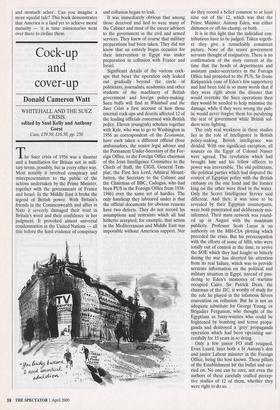Cock-up and cover-up
Donald Cameron Watt
WHITEHALL AND THE SUEZ CRISIS edited by Saul Kelly and Anthony Gorst Cass, £39.50, £16.50, pp. 250 The Suez crisis of 1956 was a disaster and a humiliation for Britain not in mili- tary terms, possibly, but in every other way. Most notably it involved conspiracy and misrepresentation to the public of the actions undertaken by the Prime Minister, together with the governments of France and Israel. In the Middle East it broke the legend of British power. With Britain's friends in the Commonwealth and allies in Nato it severely damaged their trust in Britain's word and their confidence in her judgment. It provoked almost universal condemnation in the United Nations — all this before the hard evidence of conspiracy and collusion began to leak.
It was immediately obvious that among those deceived and lied to were many of the Cabinet and most of the career advisers to the government in the civil and armed services. They knew of course that military preparations had been taken. They did not know that an entirely bogus occasion for their intervention in Egypt was under preparation in collusion with France and Israel.
Significant details of the various cock- ups that beset the operation only leaked out gradually beyond the circle of politicians, journalists, academics and other students of the machinery of British government and foreign policy-making. Suez buffs will find in Whitehall and the Suez Crisis a first account of how those internal cock-ups and deceits affected 12 of the leading officials concerned with British policy. Eleven young(ish) scholars together with Kyle, who was to go to Washington in 1956 as correspondent of the Economist, have each taken a different official (four ambassadors, the senior legal adviser and the Permanent Under-Secretary of the For- eign Office, to the Foreign Office chairman of the Joint Intelligence Committee to the Chiefs of Staff, the CIGS, General Tem- plar, the First Sea Lord, Admiral Mount- batten, the Secretary to the Cabinet and the Chairman of BBC, Cadogan, who had been PUS in the Foreign Office from 1938- 1946) over the same set of hurdles. The only handicap they laboured under is that the official documents for obvious reasons have two defects. They do not record his assumptions and restraints which all had hitherto accepted; for example, that action in the Mediterranean and Middle East was impossible without American support. Nor do they record a belief common to at least nine out of the 12, which was that the Prime Minister, Antony Eden, was either dishonest or off his chump, or both.
It is in this light that the individual con- tributions have to be judged. Taken togeth- er they give a remarkably consistent picture. None of the senior government servants thought of resignation. There is no confirmation of the story current at the time that the heads of departments and assistant under-secretaries in the Foreign Office had protested to the PUS, Sir Ivone Kirkpatrick (one of Eden's few supporters) and had been told in so many words that if they were right about the disaster that would overtake the Suez operations then they would be needed to help minimise the damage, while if they were wrong the pub- lic would never forgive them for paralysing the seat of government while British sol- diers were fighting.
The only real weakness in these studies lies in the role of intelligence in British policy-making. British intelligence was divided. With one significant exception, all sources on the Egypt of Colonel Nasser were agreed. The revolution which had brought him and his fellow officers to power was irreversible. The old politicians, the political parties which had disputed the control of Egyptian policy with the British embassy on the one hand and the former king on the other were dead in the water. Only the Secret Intelligence Service said different. And they, it was soon to be revealed by their Egyptian counterparts, were both penetrated and deliberately mis- informed. Their main network was round- ed up in August with the maximum publicity. Professor Scott Lucas is an authority on the MI6-CIA plotting which preceded the crisis. But his preoccupation with the efforts of some of MI6, who were totally out of control at the time, to revive the SOE which they had fought so bitterly during the war has diverted his attention from its real failure, which was to provide accurate information on the political and military situation in Egypt, instead of pan- dering to Eden's memories of wartime occupied Cairo. Sir Patrick Dean, the chairman of the JIC, is worthy of study for the role he played in the infamous Sevres convention on collusion. But he is not an adequate substitute for George Young, or Brigadier Fergusson, who thought of the Egyptians as fuzzy-wuzzies who could be frightened by bombing and terror propa- ganda and destroyed a 'grey' propaganda operation which had been operating suc- cessfully for 15 years in so doing.
Only a few junior FO staff resigned, Evan Luard, later both a St Antony's don and junior Labour minister in the Foreign Office, being the best known. These pillars of the Establishment bit the bullet and car- ried on. No one can be sure, not even the authors of these carefully crafted percep- tive studies of 12 of them, whether they were right to do so.






















































































 Previous page
Previous page